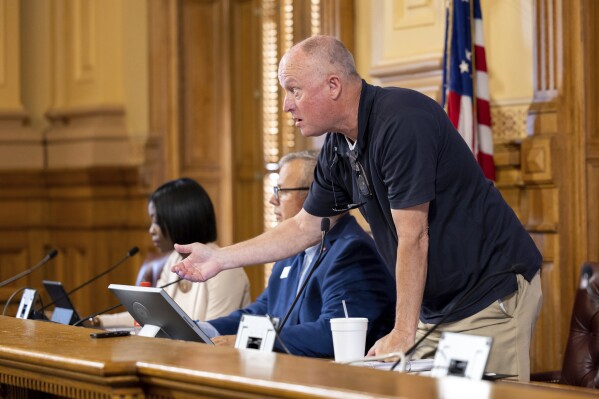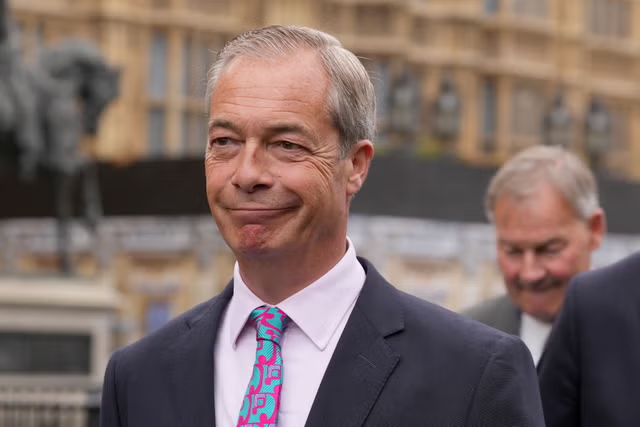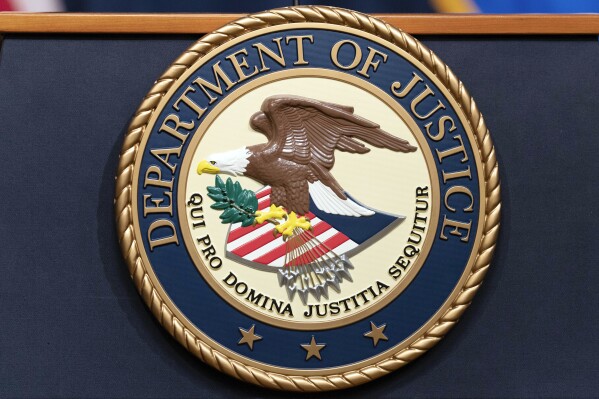Reform UK opens its annual conference in Birmingham sporting its first elected members of parliament, a much-expanded membership, and plenty of enthusiasm. Its leader, Nigel Farage, who has been knocking around at the top of politics for longer than all his many rivals combined, has made it into the Commons, on his eighth attempt. He has pledged to spearhead “the real opposition” to the Labour government...
What’s the mood?
Pretty upbeat. They’ve broken into the British parliament at last, and are, as they put it, relishing being foxes in the hen house. The rebellious vibe worked well for Farage and the gang in the European parliament, but the Commons is different, and so far none of Reform’s new MPs – Farage (Clacton), Richard Tice (Boston and Skegness), Lee Anderson (Ashfield), Rupert Lowe (Great Yarmouth) and James McMurdock (South Basildon and East Thurrock) – has made much of an impact; instead they have been schooled by the government front bench.
Even so, the party came third in the popular vote at the general election, harvested 4 million votes (14.3 per cent), and now has the status and platform that the Commons provides. Party membership is claimed to stand at about 80,000 (against, say, 140,000 for the Tories), and some money is coming in. Meanwhile the Tory party is in disarray, and the Labour government is slipping in the polls.
Farage and his allies have spotted an opportunity to push their far-right populist agenda, and believe they can retake, on behalf of the populist right, the “red wall” seats won by Johnson in 2019 that reverted to Labour in July.
What’s the conference about?
Three things. First, the aim is to create a more conventional, democratic party structure. Reform UK Party Limited is basically a renaming of The Brexit Party Limited, both majority-owned by Farage. The reason for this is that Farage found the executive committee and the democratic ways of his first vehicle, Ukip, intolerable. There’s no draft constitution yet, just a commitment by Farage to hand his shares in the company over to the membership (so it may still have a corporate structure).
Second, and in tandem with that, Reform wants to build a national network of branches and activists to take the party forward – it had very little in the way of a “ground campaign” at the general election.
A distant third seems to be serious policy formulation. The manifesto for the last election, styled as a “contract”, had an eccentric and provisional air to it, and Farage freely ditched bits of it that he didn’t like. At the moment, the approach is to blame immigration, “woke” culture, net zero and a supposedly incomplete Brexit for everything from not getting a GP appointment to “two-tier justice” to the gas bill. It’s a clear proposition, but essentially the same old facile, fraudulent nonsense that lumbered the UK with Brexit.
Will Reform UK be ‘the real opposition’ to the Starmer administration?
It’ll have competition. Ed Davey, who did far more damage to Tory representation in the Commons than Farage, also lays claim to the title, albeit with a more constructive edge. And of course we have yet to see the mettle of the woman or man the Conservatives choose to lead them back from the wilderness.
Farage won’t be short of empty promises, but he’ll not go unchallenged. Of course, Farage has the great advantage that he can never be outflanked on the right by any Conservative leader, as has been apparent in recent years.
What are Reform’s challenges?
First, it is very much a one-man band, heavily dependent on Farage. Second, the main downside of nationalist populism is that, to the extent that Brexit and Boris Johnson put it into practice, it has visibly failed – and the arguments don’t withstand scrutiny. The other downside of nationalist populism is that it doesn’t really have a unifying ideology beyond mild racism, which means that the party is prone to splits, and that its policies lack credibility.
This was the case with Ukip, which is actually still staggering on, and Reform UK, led by Farage, may well fall prey to the same sort of factionalism and backbiting that debilitated its predecessor. Fissures are already visible. Some of the troops, for example, want to ally themselves with “Tommy Robinson” and the likes of Britain First, and smash the Tories for ever; others would rather merge with the Conservatives (if they’d agree to – it’s a divisive issue in that party too).
There are also big differences on support for Ukraine, and potentially on whether the party should adopt an anti-vaccination stance and embrace other conspiracy theories (eg “chemtrails”).
Farage’s interventions in the recent “Farage riots” also highlighted how hazardous it can be to swim in the waters of the British extreme right; the riots were not popular and didn’t spark some kind of revolutionary moment, as some on the far right seemed to hope they would.
What’s the next step?
Just as the European elections often gave Ukip a boost with their system of proportional representation, so the relatively small ward sizes will help Reform UK win some seats in the county council elections next year (there are 2,300 seats up for election). However, the party will need to vet its candidates rather better than in the past if it’s to avoid embarrassment and links to neo-Nazis.
Will Farage ever become prime minister?
That depends on the next leader of the Conservative Party.
Disclaimer: The copyright of this article belongs to the original author. Reposting this article is solely for the purpose of information dissemination and does not constitute any investment advice. If there is any infringement, please contact us immediately. We will make corrections or deletions as necessary. Thank you.



